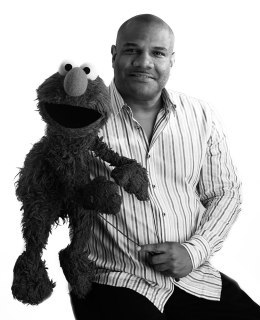
Kevin Clash sits for a portrait shoot with TIME in Oct. 2011.
The resignation of Kevin Clash – the voice of “Sesame Street’s” Elmo – following allegations of sexual relations with at least two underage boys may have short-term repercussions for the PBS kids’ show. But in the long run, “Sesame Street’s” brand is likely to survive intact.
Few brands can match the reach of a show like “Sesame Street.” Three generations of Americans have grown up with the kids’ show, and the series and its characters – from Big Bird to Cookie Monster to Oscar the Grouch – are beloved throughout the country.
(MORE: Black Friday: Fast and Frenzied)
“There are very few brands that are ‘motherhood brands,’” says branding expert Rob Frankel, describing a type of brand that “can’t be attacked because it’s 100% goodness. … They essentially can do no wrong. You saw this in the election.” Frankel’s referring to former Republican presidential candidate Mitt Romney’s pledge to pull funding for PBS and essentially place Big Bird into retirement. The Obama administration used Romney’s Big Bird comments against him in a series of relentless TV spots.
“It’s like a gun blowing up in your face,” he says. “The guy casting the aspersion gets hurt, not the brand.”
That’s why Frankel believes that “Sesame Street” will not only survive the Kevin Clash episode relatively unscathed. It could actually see a favorable bump in its ratings and merchandise sales.
Elmo has been “Sesame Street’s” most popular resident since 1996 when Tyco introduced the wildly popular Tickle Me Elmo doll. Parents went crazy for the toy during the holiday shopping season, some paying upwards of $1,500.
Today, Hasbro – the sole “Sesame Street” toy maker – brings in an estimated $150 million in annual retail sales just from Sesame Street toys, according to Gerrick Johnson, a toy analyst for BMO Capital Markets. And Elmo toys alone account for 50% to 75% of those items.
“Elmo is hands-down the most important character from a toy licensing perspective,” says Johnson.
The Clash incident may persuade some parents to avoid getting their kids an Elmo toy this year, but Johnson says it’s likely to have only a marginal impact.
“For kids asking for Elmo, they’re still going to get Elmo,” he says. “What mom is going to explain to her son why she didn’t get her son Elmo just because she’s repulsed by the situation?”
(MORE: Wall Street’s Bet on the Fiscal Cliff)
Branding expert Frankel goes even further than that, arguing that “Sesame Street’s” fans may rally around the brand after the scandal. He cites the recent controversy involving Chick-fil-A’s president, who supports bans on same-sex marriage. Several boycotts of the chain chicken restaurant were organized this summer, but they seemed to have the opposite effect – Chick-fil-A reported an all-time sales record on what became known as Chick-fil-A Appreciation Day.
“When fans saw the brand that they support get criticized, they made it a point to get out there,” says Frankel.
As far as merchandising is concerned, however, Sesame Street seems to have a more long-term problem: Elmo isn’t as popular as he used to be. He became “Sesame Street’s” go-to toy not only because the character itself has been a hit with kids, but because it’s oftentimes much less labor-intensive than recreating the show’s other popular character – larger, feathery Big Bird.
But the last time Elmo was a true hit around the holidays was 2006, when Mattel released TMX Elmo. Hasbro — which won a deal to make all Sesame Street toys in 2009 — released a statement this week saying it was confident that Elmo would remain integral to kids for years. While “Sesame Street’s” brand isn’t likely to be permanently damaged, for many reasons Elmo itself seems in need of a serious uplift.
“In the toy aisle, Sesame Street has been in decline,” says Johnson. “The last year Elmo had its mojo back was in 2006. His best days are probably behind him.”

